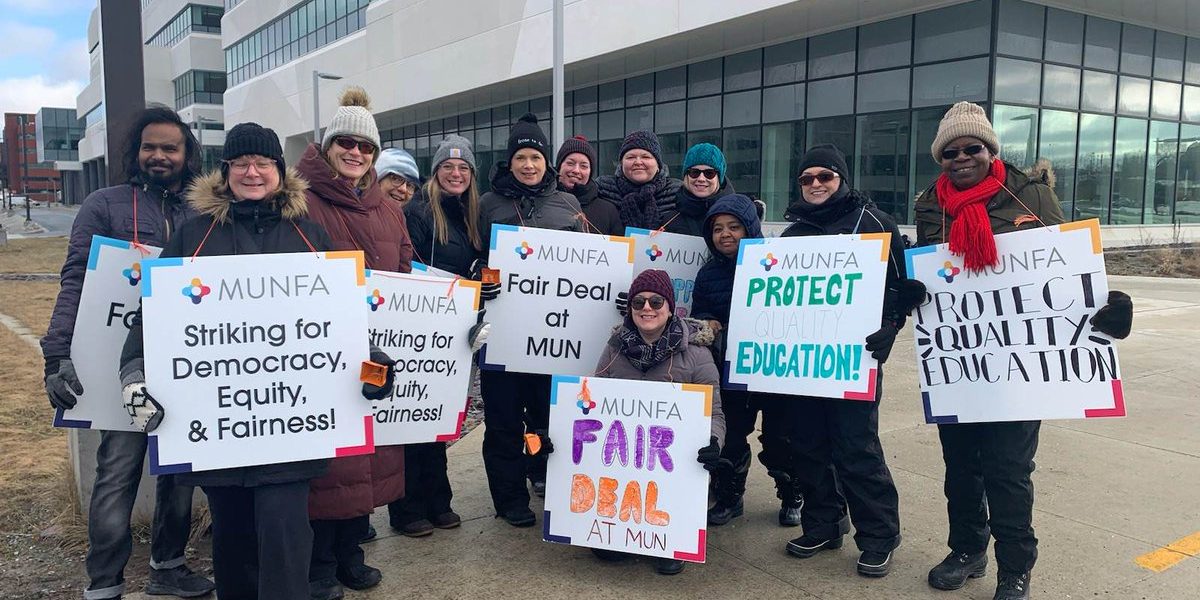On January 30, 850 faculty, librarians, counselors, and co-operative and field educators at Memorial University of Newfoundland went on strike. The members of the Memorial University of Newfoundland Faculty Association voted 90 percent in favour of the strike, with a 93 percent turnout, after their employer refused to return to the bargaining table after December 1 2022.
Fighting for contract faculty
MUNFA members are fighting to protect their most precarious workers who are forced to string together 4 to12 month contracts and often struggle to make decent wages. These types of contracts create many barriers for staff who are forced to waste time re-applying for their next contract and find it difficult to plan their futures. Solidarity with contract workers is central to the strike. Without raising the floor of workplace standards, other workers won’t be able to defend or improve their working conditions.
The percentage of contract positions compared to tenured or on-track tenure positions has been increasing for years. MUNFA notes there are over 100 open-tenure track positions that remain unfilled. MUNFA says that “instead of financing new faculty positions, this money is being spent on administrative positions and other non-teaching positions”. The union has proposed that the trend in precarious contract employment could be reversed if people in contractual positions were able to gain employment after 4 years.
Demanding transparency and accountability
MUNFA is also pursuing a commitment to collegial governance, which would give faculty a seat at the table in the decisions that directly impact their conditions of work. This would increase transparency and inclusivity of university governance for faculty and students. MUNFA is emphasizing that the full participation of academic staff would not add extra costs for the university. As MUNFA notes, “collegial governance doesn’t cost Memorial a penny, so Administration’s unwillingness to move on this issue isn’t about money. This reflects the the administration’s desire to shift education in the province towards a corporate, profit-driven model.”
This shift away from public education comes two years into the end of MUNs historical tuition freeze, after facing $68 million dollar cuts in annual government funding.
Fair wages
While the focus of this strike has not been around wages, MUNFA are bargaining for increases to address an 18 percent real wage cut as a result of inflation. Bridging this gap is a matter of dignity for MUNFA workers who are amongst the lowest paid university instructors in Canada and Atlantic Canada. The administration is offering an 8 percent pay increase over the life of a four year contract, well below inflation. The union is demanding a 15 percent increase over four years.
The university has additionally been pushing for a two-tiered system of post-retirement benefits that will disproportionately impact new instructors and contract workers. Meanwhile MUNFA has faced criticism on spending practices after a recent three-day conference of administrators on Fogo Island cost an estimated $100,000.
MUNFA has also outlined climate demands as a part of their fight for a liveable future for them and their students. In September 2020 MUNFA circulated a Climate Action Petition with demands for resource mobilization, carbon neutrality by 2030 and increased sustainability curriculum. Despite this, the university has consistently rejected their climate proposals throughout bargaining.
Student solidarity
There has been an outpouring of support from students on the picket lines, who show their allegiance with yellow scarves and “Students and faculty united” buttons. On Wednesday, the MUN Music society outnumbered faculty, leading group rounds of ‘Why can’t we be friends’ and ‘Do you hear the people sing?’. Students who couldn’t attend in person brought picketers hundreds of hand warmers and coffees. On Twitter, students and faculty circulate videos of union-themed sea shanties and #MUNFApets. Supporters, including students are also making their voices heard by emailing the faculty using their one-click tool.
MUNFA has been clear that supporting students is key, repeating “our working conditions are your learning conditions’. They have continued to lobby the administration to provide academic amnesty to students who do not want to cross the picket line so that they are not penalized with missed classes and exams. The university has declined. The strong strike mandate, high member participation and visible support from students can not only win this strike for MUNFA, but it can help build the power to make Memorial University better for all workers and students.
Did you like this article? Help us produce more like it by donating $1, $2, or $5. Donate

